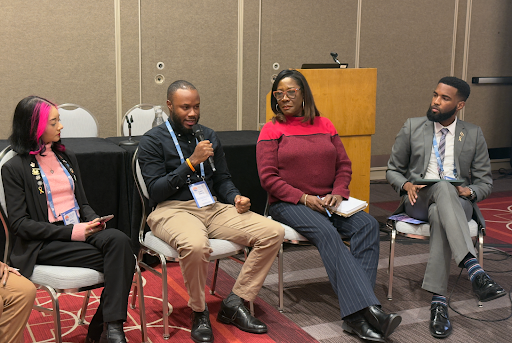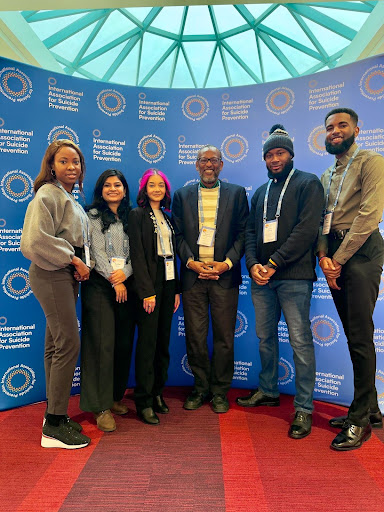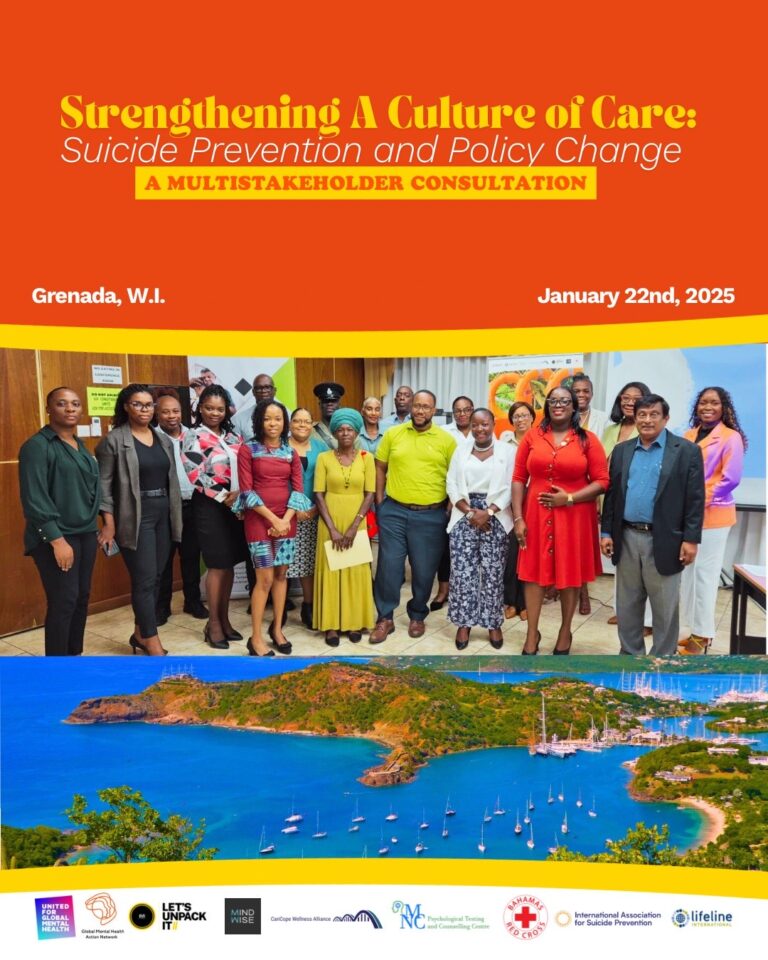Suicide Decriminalisation
Criminalising suicide doesn’t prevent people from acting on suicidal thoughts: it simply stops them from reaching out and seeking help in times of acute crisis.
SUICIDE: THE CHALLENGE
727,000 people die by suicide every year – and for every person who dies, many more attempt suicide. Globally, suicide accounts for more than one in every 100 deaths and for each death there are 20 suicide attempts.
WHO’s Mental Health Atlas 2024 indicates that suicide is having a particularly alarming impact on young people: it is the second leading cause of death in 15-29 year-old females; and the third leading cause of death in males in this age group. People who face discrimination – such as the elderly, the LGBTQI+ community, refugees and migrants, indigenous people and prisoners, are also more at risk.
While suicide is an issue everywhere, over 73% of suicides occur in low- and middle-income countries. Suicide is highly stigmatised and may be misclassified due to laws that criminalise suicide. This prevents countries from recognising it is a public health concern and tackle it effectively.
DECRIMINALISING SUICIDE
In at least 24 countries, anyone who attempts suicide can be arrested, prosecuted, or punished by fines or even one to three years in prison. The criminalisation of suicide deters people from seeking help, further stigmatises mental ill health, and hampers efforts to prevent, diagnose, and treat mental health conditions.
One simple step to help reduce suicide would be to decriminalise it in every country in the world. Progress is being made. In recent years, legislation criminalising suicide has been successfully repealed or superseded by new and more humane legislation in Guyana, Pakistan, Ghana, Malaysia, the Cayman Islands, Cyprus, Singapore and India.
“Suicide criminalisation restricts governments from taking positive actions towards suicide prevention…. in the first 10 months after suicide was decriminalised and the police role changed, the suicide rate in Singapore dropped significantly.”
– Professor Brian Mishara, Founder, Centre for Research and Intervention on Suicide, Ethical Issues and End-of Life Practices (CRISE)
DO YOU NEED SUPPORT?
United for Global Mental Health is not a provider of mental health support services or guidance. If you feel you need mental health support, please visit Find A Helpline who have identified over 1,600 free and confidential support resources available over phone, text or web chat.
SUICIDE DECRIMINALISATION: OUR APPROACH
UnitedGMH launched its Suicide Decriminalisation campaign at the end of 2020. We’ve since successfully supported the decriminalisation of suicide in Pakistan, Ghana and Guyana.
We believe everyone has the right to the highest attainable standard of mental health. But this cannot happen while legislation is in place that discriminates against people in acute crisis and prevents them from seeking help.
With UnitedGMH support, our national partners advocate to decriminalise suicide in their countries. We help them generate media coverage and provide them with:
- resources
- policy positions
- messaging
- connections with partners that have successfully decriminalised suicide in their countries
- opportunities to engage their policymakers on the issue and identify champions.
We strive to push the issue up the global agenda. For example, we facilitated the inclusion of suicide decriminalisation across SIDS nations as a commitment in the Bridgetown Declaration, which was issued at the SIDS Ministerial Conference on Noncommunicable Diseases and Mental Health in 2023.

UnitedGMH’s Caribbean CSO partners working towards decriminalisation in the region
OUR WORK SO FAR
For World Suicide Prevention Day 2025, we have published a practical guide on advocating for the decriminalisation of suicide and related policy change.
The guide compiles and simplifies a range of advocacy resources to support, inspire, and equip advocates as they work toward legislative reforms in their countries.
Featuring case studies from Ghana, Pakistan, and several Caribbean nations, it highlights the voices and first-hand experiences of those who have successfully navigated or are navigating policy change, while also outlining the key steps required to achieve reform.
This resource contributes to advancing evidence-based, compassionate, and human rights oriented approaches to suicide prevention.
In 2024, we collaborated with the Thomson Reuters Foundation’s TrustLaw programme to o research the legal frameworks of countries where suicide is still criminalised.
On World Suicide Prevention Day in September 2024, we launched a report on decriminalising suicide, titled Saving Lives, Reducing Stigma. The report profiles 23 countries where suicide remains a criminal offence, outlining existing legislation, its impact, potential pathways to change, and a snapshot of ongoing reform efforts.
Suicide decriminalisation efforts around the world
We advanced decriminalisation efforts in several other partner countries in 2023, including Ghana, Guyana, and Pakistan helping bring about legislative changes and establishing national suicide prevention strategies.
In collaboration with organisations such as the IASP, and with the support of the Global Mental Health Action Network (GMHAN), we helped set up a suicide decriminalisation working group to drive these efforts forward.
We worked with the WHO on drafting and disseminating suicide decriminalisation guidelines, informed by consultation with experts and campaigners from our network.
“Suicide needs to be decriminalised to humanise people’s distress and society’s response to it.”
– Natalie Drew, Mental Health Policy & Service Development, WHO
“[Suicide] is a public health issue, it is not an offence…The patient should be provided with treatment and not sent to prison.”
– Senator Shahadat Awan, Pakistan
This story of progress in various countries was covered in the Guardian and Aljazeera.
Launching a campaign to decriminalise suicide in the Caribbean

Caribbean coalition representatives hosting a panel discussion on the decriminalisation of suicide at the IASP Conference in Minneapolis, 2024
In May 2024, we hosted a workshop with civil society, national and global organisations to build the capacity of Caribbean national partners to advocate for the decriminalisation of suicide in the remaining four countries that still criminalise it- St Lucia, The Bahamas, Trinidad and Tobago, and Grenada- leading the way to pan-American decriminalisation.
The workshop helped mobilise CSO partners, mental healthcare professionals, people with lived experience of mental ill health, and young people from the Caribbean to form a regional coalition to focus advocacy efforts in the region. The Caribbean Regional Coalition for Decriminalisation of Suicide was launched in July 2024, and is working towards developing national advocacy strategies and supporting campaigns for achieving decriminalisation across the Caribbean.
“Our legislation (on suicide decriminalisation) dated back to the 1930s, which was quite irrelevant for modern era medical legislation and we wanted to change that.”
-Hon Dr Frank Anthony, Minister of Health, Guyana
Global spotlight on the issue of policy change and suicide prevention
To highlight the urgent need for suicide prevention, we co-organised a side event with the Kingdom of the Netherlands at the World Health Assembly (WHA) in May 2025, titled “Suicide Prevention: A Call for Policy Change and Public Health Action.” Providing a vital platform for discussion, knowledge sharing, and collaboration to strengthen global suicide prevention efforts, the overriding consensus remains that criminalising suicide does not save lives. Support does.
Along with CSOs, advocates, and mental health experts, over 15 government missions attended and made commitments to strengthen suicide prevention efforts back in their home countries. Member states such as India, Guyana, Japan, Bangladesh, and the Philippines shared their existing strategies and programmes for suicide prevention, fostering a culture of learning through intercountry exchange and experience.
Our Impact
In 2024, following our capacity building workshop and activities, we were able to mobilise additional funds to support mental health advocacy in the Caribbean region and in Sierra Leone, through USAID.
Over 40 organisations across the Caribbean region and Sierra Leone now have the knowledge and understanding to undertake effective advocacy, through fundraising, media involvement, and strategic engagement with parliamentarians. This will create an enabling environment for legislative change in these countries along with increased media awareness and public support.
In 2024, suicide decriminalisation received heightened coverage in the regional and national media, including in prominent media outlets widely followed by policymakers like Trinidad and Tobago Newsday, Trinidad Express, and the Bahamas news bulletin, Top African News, and Business Ghana with an overall audience reach of over 2 million.
UnitedGMH and the Caribbean Suicide Decriminalisation Coalition (CSDC) partnered on a workshop and panel discussion at the International Association of Suicide Prevention’s Pan-American Conference in Minneapolis in November 2024, presenting the rationale and successful methods to decriminalise suicide in the Caribbean. As a result, Professor Gerard Hutchinson an independent senator from the Republic of Trinidad & Tobago, pledged his support for the work being done by the Caribbean regional coalition aimed at decriminalisation of suicide and called on fellow policymakers to prioritise suicide prevention.
“It is unfortunate that Trinidad & Tobago is one of the Caribbean nations criminalising suicide…it has now become a priority for us – amending the law to decriminalise suicide.”
-Professor Gerard Hutchison, independent senator from the Republic of Trinidad & Tobago.

Despite funding setbacks in early 2025, UnitedGMH supported partners such as Caricope Wellness Alliance in Grenada and St. Lucia, and the Mental Health Coalition, Sierra Leone (MHCSL) in Sierra Leone to engage in stakeholder consultations with policymakers, religious leaders, healthcare workers, and bureaucrats to discuss pathways to decriminalising suicide in their respective contexts.
As a result, suicide decriminalisation was discussed in the upper house of Grenada’s parliament, where the Minister of Social Development recognised it as a significant step forward in improving mental health services and reducing stigma, urging the government to work towards decriminalisation.
“As a ministry we believe that in order for us to move forward to continue promoting mental health services for all citizens, suicide decriminalisation must become an essential part of our advocacy.”
-Senator Gloria Thomas, Minister of Social Development, Grenada

WHAT’S NEXT
In 2025 and beyond, we’ll focus on decriminalising suicide in the countries with the greatest potential for change. These include the Caribbean countries, Sierra Leone, and Nigeria, which have been influenced by Ghana’s decision to decriminalise in 2023.
In the Caribbean, we will continue to work with our regional partners and capitalise on the existing momentum to advocate for pan-American decriminalisation by focusing on the remaining countries that continue to criminalise suicide: Grenada, Trinidad & Tobago, St. Lucia, and the Bahamas.
In Sierra Leone, which is poised to update its mental health legislation and replace its outdated 1902 Lunacy Act, we’re working with partners to decriminalise suicide through the new Mental Health Act.
In Nigeria, we’re a part of the suicide prevention advocacy working group and have helped generate national media coverage on decriminalising suicide there. As a result of the continued efforts of the advocacy group, decriminalisation of suicide was discussed in the Nigerian parliament in March 2025.
Get Involved
The Global Mental Health Action Network (GMHAN) is the world’s leading advocacy network for better global mental health. If you would like to get involved in GMHAN’s work on suicide decriminalisation, register to become a member of the network today.